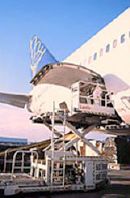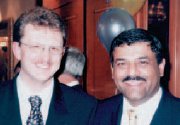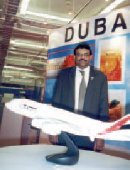|
You are currently
in the Archives section. Please be aware that some information and links
in the archived page may be outdated.
Click here
to return to the Archives' main page to see the list of archived articles.
|
A
R C H I V E S
SPECIAL
FEATURES
AIRLINE OF
THE YEAR
It’s
not with just a little consideration that we salute Atlas Air as Air Cargo
News 2002 Airline of the Year.
Let’s face it, there are almost as many
heroic stories in the past twelve months to be told as there are airlines
flying around out there.
Atlas Air by exact definition is not even
an airline, but rather a phenomenon that company founder, the late Michael
Chowdry invented.
Atlas is an ACMI—Aircraft-Crew-Maintenance-Insurance
operator.
|
The late Michael
Chowdry (left), founder of Atlas and Richard Shuyler (right), current
CEO of Atlas. While Atlas, post 9/11 struggles (like everyone else),
Rick & Co. show the guts to persevere. |
But
Atlas Air and specifically its CEO Rick Shuyler gets our nod as air
cargo’s best for the company’s tenacious, tough and never say die attitude
during what we are sad to confirm, is the worst year in commercial aviation
history.
But before we go any further let’s back
up a moment.
Just as the century turned its first full
year, Atlas Air Worldwide Holdings successfully completed an IPO that
made its founder, the aforementioned Michael Chowdry, and some others
very wealthy.
The company began Year 2001 full of hope
with a billion dollar market cap, a fleet of B747-400s and other aircraft
at work on lease or ACMI all over the place, and a wish-list of new
ideas yet to be acted upon.
 At
that point just having come out of the go-go 1990s, the horizon seemed
endless. At
that point just having come out of the go-go 1990s, the horizon seemed
endless.
But then Mr. Chowdry, who held his pilot’s
license and regularly enjoyed a few hours aloft in any number of exotic
collectible aircraft he kept at a base near the old Atlas headquarters
in Golden, Colorado elected to take a short hop with a reporter from
the Wall Street Journal.
All things considered, as Atlas was about
to release financial figures, contact with a writer from the most influential
financial newspaper on the planet, that included a brief jaunt into
a crystal blue Rocky Mountain sky seemed like a good idea.
But just like a black cloud which suddenly
turns day into night, in less than an eye blink after take off, Mr.
Chowdry and the reporter died instantly as the plane crashed.
Everything terrible that happened to Mike
Chowdry occurred in a moment. It’s likely that neither man ever knew
what hit them.
But up in Purchase, New York at Atlas
Air headquarters, life had to somehow continue amidst unbelievable shock
and grief, not to mention the empty hole that faced Atlas Air itself.
Mike Chowdry had assembled a first class
team. But as far as anybody knew, Mike Chowdry was the show at Atlas.
He was the indispensable creator, the drive and ideas, the reality and
heart and soul of a great international company, fielding more than
34 B747s all over the world.
“At first I looked out my window and everything
was the same,” recalled Rachael Berry, director of corporate communications.
“But then after a short while, I realized
that there were no footsteps in the hall. No Michael Chowdry with another
idea. He was the excitement and the drive and the sense of adventure
we all felt.”
But as bad as early January 2001 was for
Atlas, nothing and probably no one could have prepared the company for
9/11.
Fallout of that horrific attack continues
right now, as companies once thought invincible, from IBM to McDonalds
and elsewhere, in every part of the business sector continue a spiral
downward driven by a kind of bottomless lack of confidence and sureness
of what lies ahead.
But despite the uncertainty, here in 2002
Atlas Air has taken delivery of aircraft and acquired Polar Air Cargo,
an acquisition most industry wags thought was one stupid thing to do.
One of the positive stories of 2002 is
the emergence of Polar Air Cargo as a prime-time quality resource. In
fact, that recent awarding of frequencies into Hong Kong will be used
for fifth-freedom flights by Polar to build up activity via Hong Kong,
Manila and elsewhere with the carrier’s growing presence at Inchon,
South Korea.
Simply put, Polar Air Cargo under Atlas
Air is the come-back cargo airline of 2002, and maybe will turn out
to be one of the great turnarounds in recent memory.
Reliability for service delivery, shipped
as booked and other critical benchmarks are on a dramatic upswing at
Polar.
Customer satisfaction has naturally followed
suit. Even operators who were licking their chops to add flights to
Hong Kong are laying back, in no small part because now Polar is a for-real
air cargo resource powerhouse.
Sure, the dock strike coupled with the
frenzy of business that is mainland China today, has helped Polar.
Likewise, the idea of acquiring Polar
may have been thought of initially during the era of Mike Chowdry at
Atlas.
But the action to take a calculated risk
at a tough time, was very much a post-Michael Chowdry decision.
The last laugh, if there need be one,
appears to go to Atlas which very well could see a big part of its future
success because of its Polar acquisition.
The other thing about Atlas we like is
that in this year of big losses, and questionable accounting practices
at Arthur Andersen after that company helped count Enron as the biggest
bankruptcy in history, Atlas needed to confront Andersen’s work on the
Atlas books.
Atlas management bit the bullet, dumped
Andersen, and when their new accountants found problems, Atlas stood
up, took the heat and moved on.
Now these financials could still jump
up and bite a bit. But the way Atlas CEO Richard Shuyler handled the
event and assured everyone that the situation was/is under control,
continues to impress.
For us here watching air cargo history
unfold, the addition of Jeffrey Erickson as company president at Atlas
is also an interesting, even intriguing move.
Once upon a time during the early 1990s,
at TWA, Jeffrey Erickson and Richard Shuyler were a potent one-two punch
at Trans World Airlines (TWA) assuming command of that airline after
it had been systematically looted by Carl Icahn.
For several years, the duo kept TWA flying
against what we know now were impossible odds.
But they did it at TWA with smart, savvy
and prudent handling of everything, including what little money the
carrier had, to dealing with a large and mostly unhappy labor force
and a fleet of aircraft that had seen better days.
Will Atlas Air make it in the 21st Century?
After what happened to United Airlines earlier last month, it is fair
to say, nothing is for certain.
But we like Atlas. They are big and tough
enough and even more, they seem to want to win. Often in history, people
with a will to do what might seem far-fetched, even impossible, surprise
everybody.
Just as we finished this salute, Atlas
announced a contract for one of their B747-200s which will go into service
at Korean Air Cargo.
Now we know Ken Choi, the old cargo pro
at KAL Cargo, who signed the contract. If Ken is signing up for Atlas
services, that indicates to us, as business crawls back and the cream
rises to the top, then the company and idea that Mike Chowdry began,
and courage continued, will be leading the way.
|
ALAS,
UNITED
United
Airlines announced Chapter 11 bankruptcy Monday, December 9, 2002.
That day in airline history will surely be bookmarked as the definitive
moment that changed everything in American commercial aviation.
But, as the slippery financial slope
accelerated the parent airline into uncharted territory for the
first time in 75 years, United Worldwide Cargo let it be known that
for its part from now and into the future, (and beyond), it’s business
as usual.
UAL Cargo Vice-President Roger Gibson
told Air Cargo News:
“Cargo has been a solid performer.
During the second quarter we assumed control of operations at a
dozen additional cargo transfer facilities in North America to insure
our standard of service that our customers demand. While revenue
went up during the quarter, by 6% we were especially pleased just
recently to score a record 8.1 million ton mile day, our best since
9/11.
“We understand the challenge our cargo
product and airline faces ahead. Yet cargo reliability has never
been higher. While there is always room for us to do better in air
cargo, we will maintain our service delivery and full product lines
as we look for ways to better serve our customers and service partners.”
UAL Cargo serves 134 destinations
in 34 countries with 1,000 flights daily. More information at www.unitedcargo.com.
 |
United
Airline’s failure in getting federal loan guarantees puts to rest
once and for all the employee stock option plan ESOP as a way to
do airline business. United stock, which once had been the most
vaunted in the industry, has just been pounded into dust.
Eighty
thousand people at an airline once owned by Boeing, with a record
of accomplishment dating back to the beginnings of recorded commercial
aviation, has been gut-punched, first by September 11, 2001 and
now by three people on a Washington panel called the Transportation
Stabilization Board (TBS).
The green eye shades and gartered
sleeves of some banker-thinking mentalities have put what they believe
or have been told is United’s ability to repay, above the future
of the largest, employee-owned airline in history, a great transportation
company, developed during more than 75 years of service to America
and the world.
“It’s a free market,” is what will
be said. “United’s business plan was no good,” is what is already
in the news, as quoted from some sources.
We kept thinking what if Lee Iacocca
had to go before these guys when he was trying to save Chrysler?
At what point do we finally say that we cannot allow a company to
go down?
Couldn’t these men use their money
to work change at United?
Unlike other failures this year, United
apparently was not doing business in the manner of, say Enron or
other companies, which figured out a way to create and boost their
stock market value with smoke and mirrors.
Maybe the business plan is/was flawed.
But, everything needs to be questioned
including the politics of why United has been cut loose by the U.S.
Government at a time of its maximum peril. What you hear and read
right now must be viewed in historical perspective. That means,
perhaps some time down the road, what really happened to United
will turn out to be quite different than what we are told or believe
we know, right now.
When Pan Am had a B747 blown from
the sky above Lockerbie, the flow of passengers which kept the carrier
in business dried up, and before long Pan Am was gone. There was
no offer of aid or bailouts to the carrier.
Likewise the travail of carriers worldwide
post 9/11 continues.
When you think about it, in light
of 9/11, Pan Am probably should have been offered what is now considered
‘new normal’ for businesses that are victims of terrorists.
United Airline’s biggest fault after
having flown so high, wide and handsome for three quarters of a
century is that right now in spite of everything, and because of
forces beyond control, she has come up just a little short of land.
In the overall scheme of things, what
United wanted—$1.8 billion, is chump-change next to the bigger dream
of what this airline is all about.
Maybe because it was never done before,
no one really knew how to manage an ESOP airline.
Surely, since everybody who worked
at UAL owned a piece of the company, they should have been given
some strong medicine.
But at the very least, United deserves
better from these bankers than the rude, even strangely cruel rebuff
to their attempts at survival.
Other carriers, it should be noted,
mounted an effort to influence the decision to not support the United
plan.
Continental Airlines CEO Gordon Bethune
was quoted in the NY Times:
“I’m glad we won’t have the federal
government subsidizing this competition.”
Bethune, who writes books about himself
should shut up already.
Somebody once said that there is no
such thing as a good debt or a bad mother.
It is not too much, as an American
born and raised on aviation in the 20th Century, to think of United
Airlines as mother to us all.
A Rhapsody In Blue is sent back to
United.
|
|
|
RAM
MENEN:
AIR CARGO EXECUTIVE
OF THE YEAR
 |
Ram
Menen is no dummy.
But somewhere inside this most genteel
and civilized leader of the world air cargo community, there must
be the smallest voice that speaks every once in a while as he kisses
his wife, Malou and son, Ram Jr. good-bye:
“What the hell am I doing this for?”
As General Manager air cargo for Emirates
SkyCargo in Dubai, Mr. Menen is anything, but desk-bound.
Ram finds himself on an airplane,
in a hotel room, and out of a suitcase, more days and nights than
he probably would like admitting.
But Emirates SkyCargo is on a mission
to become one of the great airlines in history.
Mr. Menen has been “Mr. Air Cargo”
at the carrier since the airline took off 17 years ago via a couple
of rented PIA aircraft.
As someone who worked his way from
the ramp up, he knows that aspiring to be something better can’t
be accomplished on the cheap.
So Ram Menen works very hard, both
for the airline and everywhere else for the air cargo industry.
But that also means daytime is whenever
you are in it.
Try this schedule for a moment. If
it’s Tuesday, then this must be Belgium. Two meetings in one place
followed by the red eye, all-night flight, followed by all-day sessions
in Rangoon or some other place, for crying out loud, are par for
the weekly schedule of Ram Menen.
If somebody at the other end of the
phone advises packing a bathing suit, Ram can only laugh.
All of that said, you couldn’t make
these things up. Someone is not named “best in class” just because
they show and work hard up all the time.
What we really like about Mr. Menen,
is his outstanding mind, sense of humility and his ultimate flexibility,
no matter the situation.
Ram Menen is a genuine original. He
is the rarest of individuals. Ram Menen has the power and will to
move us all.
The
combination of excellence that is Ram Menen, is bestowed, by whoever
makes those things up, upon a very few people.
Ram has a God-given gift if you know
what we mean.
You can put him down in the middle
of any situation, anywhere in the world, almost at any hour and
he will know what to do.
No matter what the situation, Ram
Menen is always relaxed and at home, thinking ahead, outside the
box always inclusive of what will work best for customer, company
or organization.
He always makes the best of whatever
is going on, advancing every agenda. Ram Menen is never about Ram
Menen either. Only the best people you ever knew are like that.
Take the case of the TIACA Hong Kong
show last September.
 |
Did
you notice that there was almost no news out of that show?
While others were dragging around
like a bummed out Li’l Abner, Ram Menen was sizing up Hong Kong
or Shanghai, as destinations for Emirates SkyCargo.
Just a day before, EK had launched
B747 all-cargo service from Shanghai to Dubai, but now he is gently
weighing the pros-and cons with a local reporter of maybe lighting
up the local sky and air cargo scene at SAR with the biggest, full
schedule air cargo freighter the world has ever seen.
“The all-cargo Airbus A380 super-jumbo
that will enter service with SkyCargo in 2008 is going to change
everything,” says Ram Menen.
“We are keeping options open. The
great thing about flying a freighter is that you can move to where
the action is. Put another way, SkyCargo is an international conveyor
belt linking up buyers and sellers everywhere.
 |
“We
know that the future will include manufacturing centers of China.
That’s why we are keeping our plans fluid.”
Here is Hong Kong wearing its heart
on its sleeve. Here too is the Prince of Light, in an era of darkness
in many parts of air cargo, doing his best to offer truth and hope.
Ram did the same thing in 1996 when
TIACA held its first, over the top, successful show ever at Dubai.
Remember that you read this here.
Without Ram Menen, it is doubtful that there would be a TIACA today.
While others have a TIACA show and
quickly fade from view (anybody ever hear again from anyone in Seattle
where the show was held just ten years ago?), Ram Menen saved TIACA
once in 1996 as mentioned, and continues to contribute today on
a major basis to the organization.
Ram Menen has brought style and class
everywhere he moves in the air cargo business.
His comments and insights are always
newsworthy and beyond that, useful to amateurs everywhere, as this
world of air cargo opens and develops as the most exciting part
of the airline business.
The interesting thing is that Ram
would tell you that he is proud to be an amateur too.
Maybe that’s why he keeps moving up.
The greatest airline in the Middle
East listens to Ram Menen.
Air Cargo News is honored to name
Ram Menen Air Cargo Executive of the Year 2002.
|
 |


